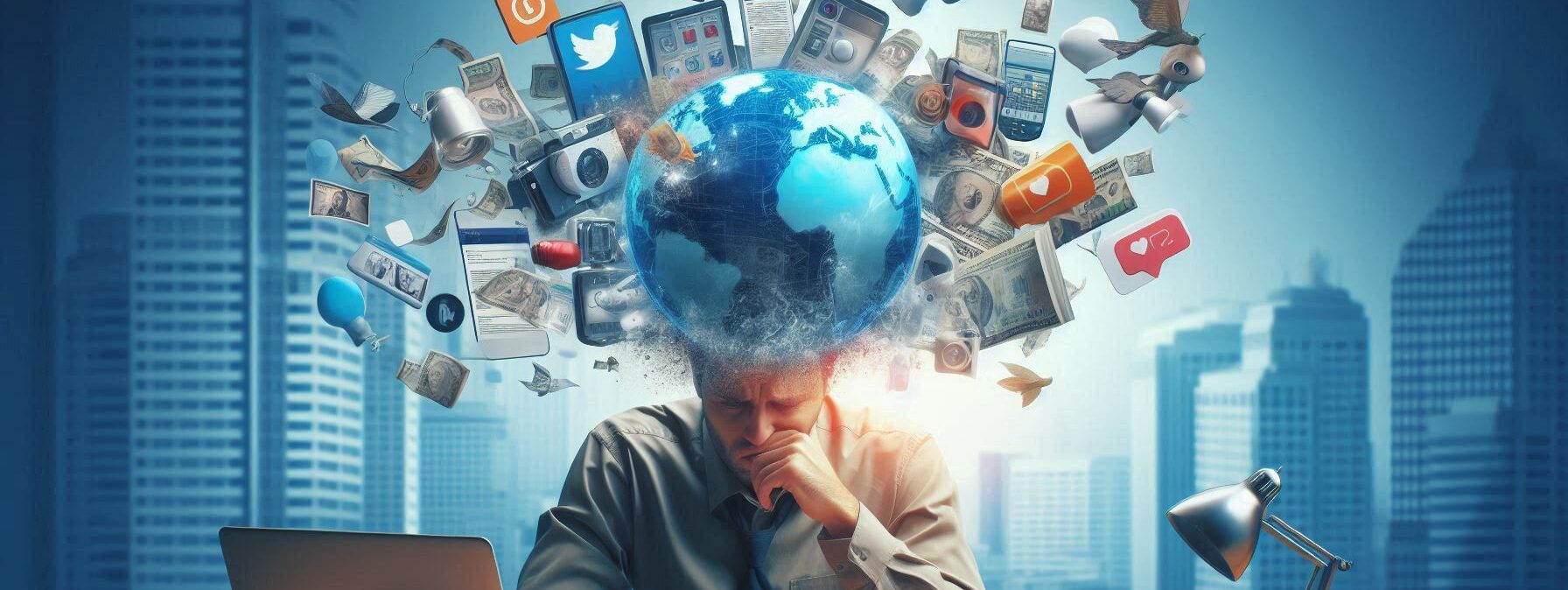Ah, social media—the magical land where everyone’s life looks like a never-ending vacation while you’re sitting at home in your pajamas, wondering if it’s too early to have ice cream for breakfast.
It’s a double-edged sword, isn’t it? On one hand, you can connect with friends, share cat memes, and find out what your high school crush is up to (spoiler alert: it usually involves avocado toast).
On the other hand, social media can also be a breeding ground for anxiety and depression. So let’s dive into this digital rabbit hole together!
Top Takeaways and Key Concepts
- Recognize the “highlight reel effect” and remember social media shows only curated, idealized moments.
- Avoid pressure to appear perfect online; unrealistic standards increase anxiety and depression risks.
- Be aware of cyberbullying’s impact, and report or block harmful interactions promptly.
- Acknowledge FOMO but don’t let fear of missing out dictate your emotional state.
- Practice digital detoxes regularly to reduce stress and reconnect with real-life experiences.
Summary of This Article
The article explores the mental health challenges linked to social media use, including the highlight reel effect, pressure to appear perfect, cyberbullying, and FOMO. It emphasizes that these online dynamics can contribute to anxiety, depression, and feelings of isolation. The piece encourages actionable strategies such as recognizing curated content, setting boundaries to avoid perfectionism, addressing cyberbullying, and taking digital detoxes to restore balance. Overall, it advocates embracing reality over online perfection to protect emotional well-being.
The Highlight Reel Effect

Let’s kick things off by talking about the highlight reel effect. You know how it goes: someone posts a picture of their perfect beach day, complete with sunset filters that make the sky look like a unicorn threw up rainbows.
Meanwhile, you’re scrolling through these idyllic snapshots while clutching your half-eaten bag of potato chips and wearing yesterday’s sweatpants.
It’s easy to feel like everyone else has their lives perfectly figured out—like they just stepped off the set of a feel-good movie while you’re stuck in a low-budget documentary titled “The Struggles of Everyday Life.”
This comparison game can lead to feelings of inadequacy and self-doubt faster than you can say “Instagram influencer.” Honestly, who hasn’t felt like they need to step up their game after seeing someone else’s lavish brunch spread?
Interestingly enough, research shows that people often curate their online personas to showcase only the best moments.
So when you’re feeling down because your Saturday night plans involve Netflix and pizza (which sounds fabulous), remember that most people are doing the same thing—they’re just not posting about it.
The Pressure to Be Perfect
Speaking of curated images, let’s discuss the pressure to be perfect on social media. It seems like there’s an unwritten rule that says if your life isn’t Instagram-worthy, did it even happen? I mean, if I don’t post my lunch on social media did I really eat it?
This constant pressure can lead individuals down a dark path filled with anxiety and depression as they try to live up to unrealistic standards.
Can we all agree that nobody actually wakes up looking like they just walked off a magazine cover? Yet somehow we expect ourselves to meet those standards every single day!
To be fair, this kind of pressure isn’t limited to adults; kids are navigating this minefield too! Imagine being in middle school today—what was once simply trying not to trip over your shoelaces now includes worrying about how many likes your latest selfie got. All things considered, it’s no wonder mental health issues are rising among younger generations.
Cyberbullying: The Dark Side of Connectivity
Now let’s talk about cyberbullying—an unfortunate downside of our hyper-connected world. Just when you thought sharing embarrassing photos from last weekend’s party was bad enough (thanks again for that), some folks decide to take things further by hiding behind screens and launching hurtful comments.
Cyberbullying can escalate quickly and have devastating effects on mental health. One nasty comment can ruin someone’s entire day—or week—while leaving them questioning their self-worth.
It feels kind of ironic that social media was designed for connection but often leads people into isolation instead.
Interestingly enough, studies show that victims of cyberbullying experience higher rates of anxiety and depression compared to those who aren’t targeted online.
So next time you’re tempted to leave an unkind remark or share something questionable online—just remember: words matter! And maybe think twice before hitting “send.”
FOMO: Fear Of Missing Out
Let me introduce you to FOMO—the fear of missing out—which seems more contagious than any viral dance challenge sweeping across TikTok.
As we scroll through endless feeds filled with parties we weren’t invited to or events happening without us (how dare they!), it’s hard not to feel left out.
FOMO can create feelings akin to standing outside a fun party while everyone else dances inside without you—a bit reminiscent of being picked last during gym class in elementary school!
This sense of exclusion contributes significantly toward feelings associated with depression as individuals grapple with loneliness.
Honestly though? Everyone experiences FOMO at some point; it’s practically part-time job status these days! But recognizing its impact is essential so we don’t spiral deeper into despair over others’ seemingly perfect lives.
Finding Balance: A Digital Detox
Now that we’ve explored the darker sides let’s talk solutions! Finding balance is key when navigating the wild world of social media—and sometimes taking breaks is necessary for mental well-being. Enter: digital detoxes!
By stepping away from screens—even if it’s just for an hour or two—you allow yourself space for real-life interactions (remember those?). You might discover hobbies you’ve neglected or reconnect with family members face-to-face instead of through emojis!
Interestingly enough, studies suggest that regular breaks from social media reduce stress levels significantly—and who doesn’t want less stress?
Next time you find yourself mindlessly scrolling at 2 AM wondering why everyone else’s life appears better than yours… consider unplugging instead!
Conclusion: Embracing Reality Over Perfection
In conclusion, while social media has its perks—like connecting with long-lost friends or finding hilarious cat videos—it also poses challenges regarding mental health awareness around depression issues faced daily by many users today.
So, here’s my advice: embrace reality over perfection! Remember that behind every polished photo lies untold stories filled with struggles similar yours—and sometimes laughter truly is the best medicine amidst chaos surrounding us all!
Suggested Resources:
Mental Health America
https://www.mhanational.org/
National Alliance on Mental Illness
https://www.nami.org/
American Psychological Association
https://www.apa.org/
Frequently Asked Questions
How does social media contribute to feelings of depression?
Curated posts can create unrealistic comparisons, leading to self-doubt, low mood, and increased vulnerability to depressive thoughts.
Why do people feel pressure to appear perfect online?
Social platforms emphasize highlight moments, causing individuals to feel they must meet idealized standards to gain approval or validation.
What role does cyberbullying play in mental health?
Cyberbullying can damage self-esteem, trigger anxiety, and significantly increase the risk of depression due to persistent negative interactions.
What is FOMO and how does it affect emotional well-being?
FOMO, or fear of missing out, creates anxiety and sadness when people compare their lives to others’ posts, often feeling excluded or inadequate.
Can taking breaks from social media improve mental health?
Yes, digital detoxes reduce stress, improve focus, and help individuals reconnect with real-world experiences that support emotional balance.
How can someone use social media more mindfully?
Setting time limits, curating your feed, and focusing on uplifting content can reduce negative impacts and promote healthier online habits.
What signs suggest social media is harming your mental health?
Increased anxiety, low self-worth, obsessive checking, irritability, or mood changes after scrolling may indicate unhealthy usage patterns.

Kevin Collier is a passionate mental health advocate and writer for SadFAQ.com, where he explores the complexities of depression and mental well-being. With a deep understanding of mental health challenges, Kevin provides compassionate insights and practical advice to help individuals navigate their journeys toward healing. His articles aim to destigmatize mental health issues, offering support and resources for those seeking to improve their emotional resilience. Committed to raising awareness and fostering open conversations, Kevin’s work empowers readers to prioritize their mental health and seek the support they deserve.




